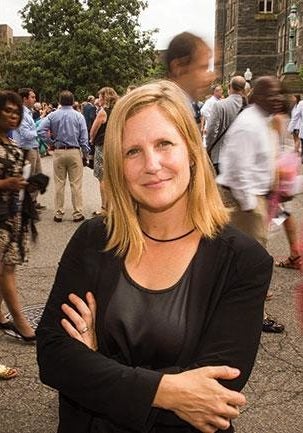2019 Distinguished Associate Professors Awards
Posted in News Story | Tagged Diversity Commitee
The Provost Office is pleased to announce the 2019 Distinguished Associate Professors:

Vishal Agrawal is an Associate Professor of Operations and Information Management in the McDonough School of Business. He received his Ph.D. from Georgia Institute of Technology. Dr. Agrawal’s research interests include sustainable operations, new product development and supply chain management. His research focuses on managerial challenges at the interface of business and the environment. He is also interested in the effect of consumer behavior on operations and new product development strategies. Dr. Agrawal’s research has appeared in leading journals such as Management Science and Manufacturing & Service Operations Management, and has received several awards including the Management Science Best Paper in Operations Management Award (2015), Paul Kleindorfer Award in Sustainability (2016), and the INFORMS ENRE Young Researcher Award (runner up 2014). He serves as an associate editor for Manufacturing and Service Operations Management and as a senior editor for Production and Operations Management.

Laia Balcells is an Associate Professor in the Government department of Georgetown College. She is a political scientist specializing in the study of political violence as well as nationalism and ethnic conflict. She earned her PhD from Yale University in 2010 and came to Georgetown from Duke. Dr. Balcells’ book, Rivalry and Revenge: The Politics of Violence during Civil War (Cambridge University Press, 2017), deals with the determinants of violence against civilians in civil war, and explores micro-level variation in the Spanish Civil War and Côte d’Ivoire. Her more recent work examines preferences for secessionism and their relationship with redistribution and identity-related factors. She has also recently explored post-war low-intensity violence (in Northern Ireland), wartime displacement (in Colombia and Spain), and cross-national variation in civil war warfare and its implications on conflict duration, termination and severity.

Shweta Bansal is an Associate Professor of Biology in Georgetown College. She completed a RAPIDD postdoctoral fellowship at the Center for Infectious Disease Dynamics at Penn State University and the Fogarty International Center at NIH. She completed her Ph.D. in 2008 in network modeling and infectious disease ecology at the University of Texas at Austin. Dr. Bansal is an interdisciplinary mathematical biologist, and her research is focused on the development of data-driven mathematical models for the prevention and containment of human and animal infectious diseases using tools from network science, statistical physics, computer physics, computer science and statistics. Dr. Bansal’s Lab focuses on the interactions that facilitate infectious disease transmission between hosts. It seeks to understand how social behavior and population structure shape infectious disease transmission, and how knowledge of such processes can improve disease surveillance and control.

Leticia Bode is an Associate Professor in the Communication, Culture, and Technology master’s program of the Graduate School of Arts and Sciences. She received her PhD in Political Science from the University of Wisconsin, Madison. Her work lies at the intersection of communication, technology, and political behavior, emphasizing the role communication and information technologies may play in the acquisition and use of political information. Her work examines the effects of incidental exposure to political information on social media, effects of exposure to political comedy, use of social media by political elites, selective exposure and political engagement in new media, and the changing nature of political socialization given the modern media environment. Her work has appeared in the Journal of Communication, Journal of Computer-Mediated Communication, New Media and Society, Mass Communication and Society, Journal of Information Technology and Politics, and Information, Communication, and Society, among others. Dr. Bode also sits on the editorial boards of Journal of Information Technology and Politics, and Social Media + Society.

Jeremy Fineman is an Associate Professor in the Department of Computer Science of Georgetown College. He joined the Georgetown community in 2011, before which he was a Computing Innovation Fellow at Carnegie Mellon. Dr. Fineman studies algorithm design and analysis, focusing on parallel algorithms, scheduling, and memory-efficient or large-data algorithms. He is also interested in classic (sequential) algorithms and data structures. He has published prolifically and has emerged as a leader among his peers. His work is well-recognized by his peers, and one of Dr. Fineman’s papers received a Best Paper award from the 2014 European Symposium on Algorithms.

Emily Mendenhall is an Associate Professor of Global Health in the Edmund A. Walsh School of Foreign Service at Georgetown University. She is a medical anthropologist who writes about how social trauma, poverty, and social exclusion become embodied in chronic mental and physical illness. Dr. Mendenhall received her Ph.D. from the Department of Anthropology at Northwestern University and MPH from the Hubert Department of Global Health at Emory University. Prof Mendenhall’s most recent project is a book forthcoming with Cornell University Press (2019), Rethinking Diabetes: Entanglements of Poverty, Trauma, and HIV. Rethinking Diabetes considers how ”global” and ”local” factors transform how diabetes is perceived, experienced, and embodied from place to place. She is also the author of Syndemic Suffering: Social Distress, Depression, and Diabetes among Mexican Immigrant Women (Routledge, 2012). In 2017, Dr. Mendenhall was awarded the George Foster Award for Practicing Medical Anthropology by the Society for Medical Anthropology.
